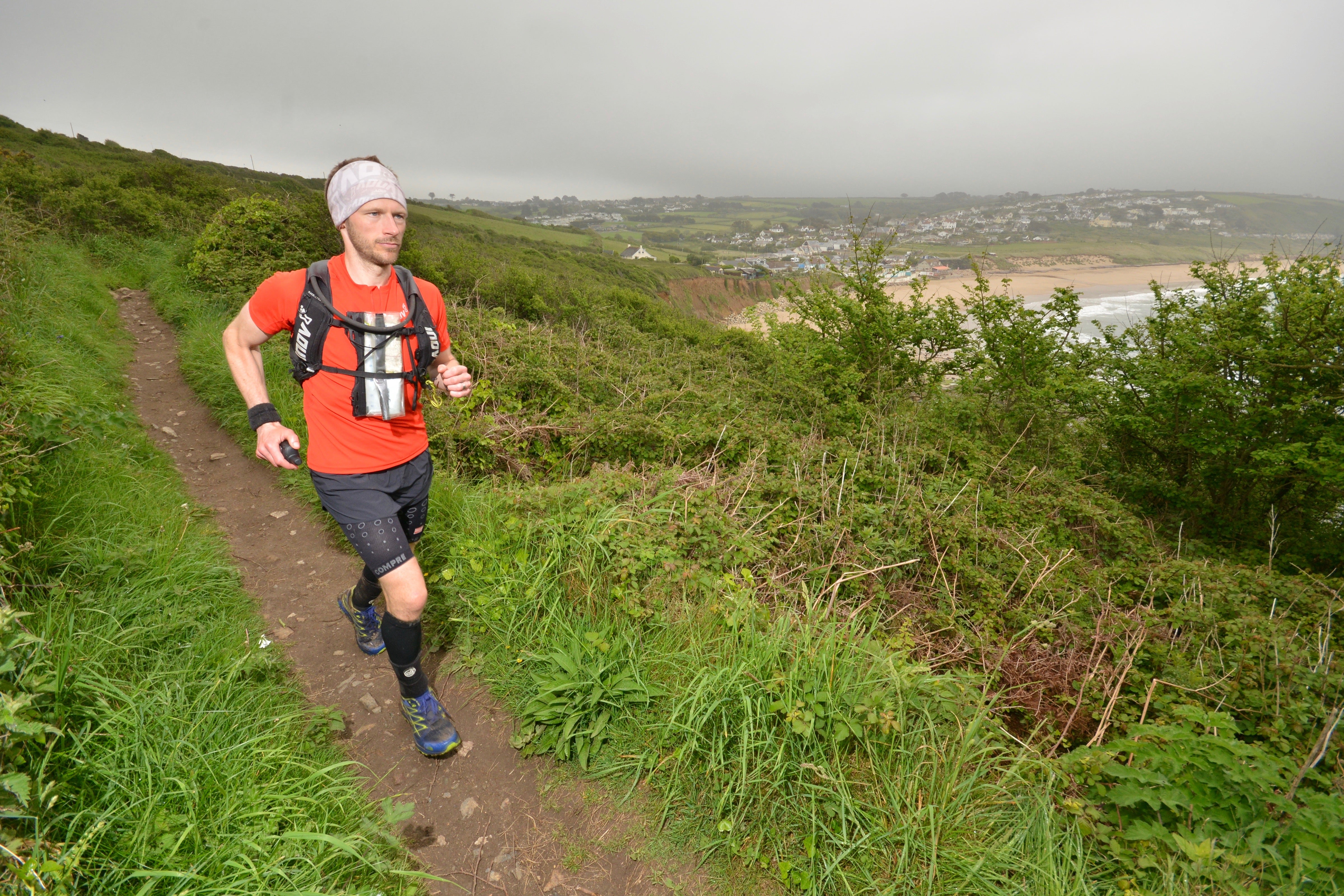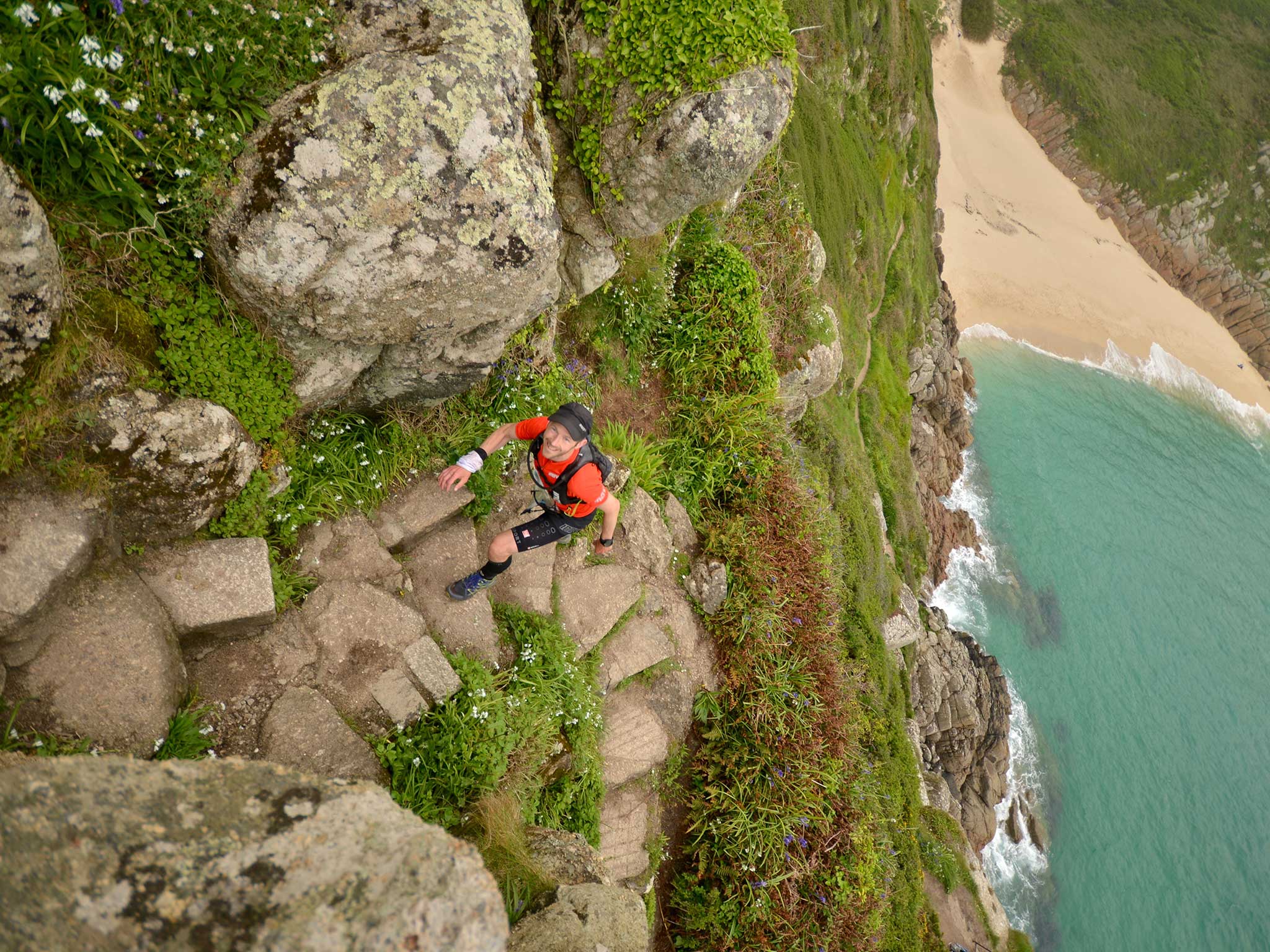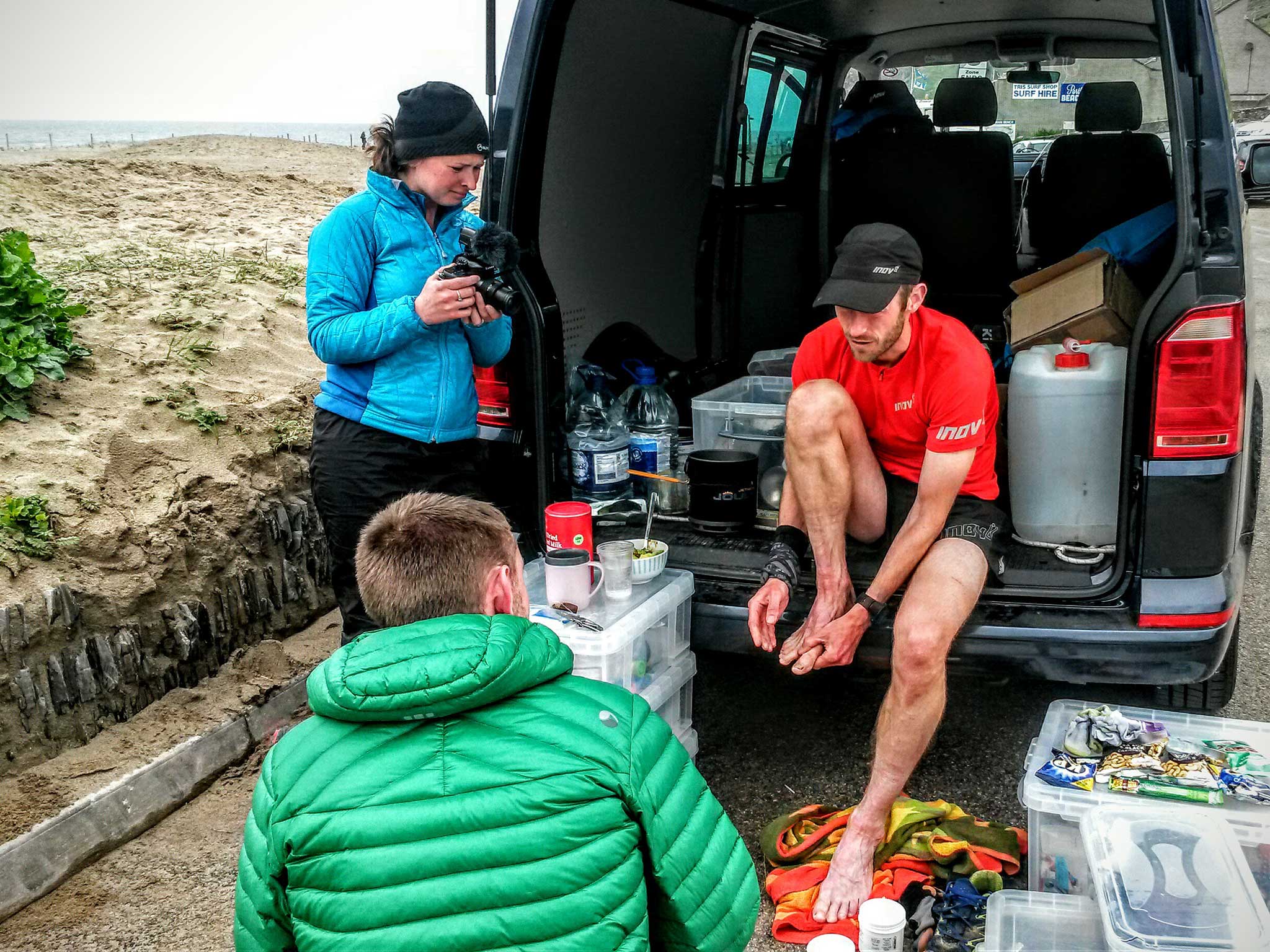Fear and loathing on the South West Coast Path
Ultra runner Damian Hall experienced sleep deprivation, tedium and tears as he tried to set a record for running Britain’s longest National Trail. Why? Because it was there

Your support helps us to tell the story
From reproductive rights to climate change to Big Tech, The Independent is on the ground when the story is developing. Whether it's investigating the financials of Elon Musk's pro-Trump PAC or producing our latest documentary, 'The A Word', which shines a light on the American women fighting for reproductive rights, we know how important it is to parse out the facts from the messaging.
At such a critical moment in US history, we need reporters on the ground. Your donation allows us to keep sending journalists to speak to both sides of the story.
The Independent is trusted by Americans across the entire political spectrum. And unlike many other quality news outlets, we choose not to lock Americans out of our reporting and analysis with paywalls. We believe quality journalism should be available to everyone, paid for by those who can afford it.
Your support makes all the difference.I find it’s better to get my short sob out of the way early in the day. Ideally between first and second breakfast. Definitely before third breakfast.
My shoes seem to be full of broken glass. My knees throb. My faithful old foe tendonitis has returned to the shin and heel on my right. On my left I have lacerations from my hip to my ankle. My tongue is spotty, swollen and weirdly tingly. My lips are sunburnt. When I clear my nose the substance is dark green and red. I’m told my breath is “rancid” and smells from the other end can’t be any sweeter. Or indeed any of my aromas – I haven’t showered for a week. But none of that is giving me sweaty eyes.
In fact, I’m not sure why I feel the need for a swift little routine weep. It’s probably something to do with the deep tiredness and emotional rawness I’m experiencing. And the daunting relentlessness of the task ahead.
I’m trying to set a Fastest Known Time (FKT) on Britain’s longest National Trail, the 630-mile South West Coast Path (SWCP). Why? Because my good friend Mark Townsend suggested it and, to a 40-year-old (midlife crisis alert!) running fanatic like me, it seemed like an irresistible adventure. I'm certainly getting one. It's more than double the distance I've ever covered before. But the ultramarathoner's obsession pushes you to ever greater distances.
I start running at 5am, after somewhere between four and two hours’ sleep in a van. A nice van. A nearly-new Volkswagen Transporter Kombi. But it’s still a van, not a bed. And it’s still not much sleep.
I need to run a minimum of 60 miles each day, ideally more. But the SWCP has around 111,000ft (34,000 metres) of ascent – three-and-a-half times up Everest from sea level. It can take over 20 hours to reach my minimum mileage target.
In my distant-seeming, previously normal, desk-bound existence, I would constantly daydream of running. At a sensible pace, and hiking steeper uphills, my running experiences have taught me it's possible to cover huge distances without much discomfort. But now I’m living that dream it feels like a Kafkaesque nightmare, of miles on top of endless miles, that never actually takes me anywhere. Maybe I’m just tired.
Mark ran the trail in 2013, setting a joint FKT of 14 days, 14 hours and 44 minutes. That had since been lowered, by Mark Berry, to 11 days, 8 hours and 15 minutes. Mark Townsend, who co-owns Contours Trail Running Holidays, wanted the record back. And he invited me along, hoping that at least one but ideally both of us would set a new record .
We set off from Poole at 5.01am on Saturday 14 May. Our ambitious plan was to run the SWCP in under 10 days – averaging 63 miles per day. But we were wary of getting injured by going too fast, so we planned to travel at a sustainable, easy pace, no faster than four miles an hour. And not sleep much.
Though Mark started with a knee problem, the first day was triumphant. We clocked up 66.5 miles as the path rose and fell alongside the Dorset sea all the way to Abbotsbury. Tom Jones (not that one), our crew man extraordinaire, fed us feasts and kept spirits high with his labrador-puppy enthusiasm. We’d never do so well again.

Day two was a perfectly acceptable, if ruddy hilly, 57.3 miles to Sheldon. But Mark, an insomniac, hadn’t slept at all in the allotted four hours the previous night. Or on the second night. That’s not good for a body trying to recover from running a couple of hilly marathons, before repeating the task the next day.
Day three was just 53 miles, to Salcombe. But we attributed slipping behind our target to a lost hour at a ferry crossing at Dartmouth. 55 miles on day four was again significantly below our 63-mile target. But we attributed the loss to all that troublesome tarmac in grey Plymouth, prompting sore feet and hiking. At least Mark got some sleep that night. An hour or so.
Day five was rubbish. We’d done over 250 miles and Mark’s self-important knee began to kick up a fuss. Three times he said he was quitting. Three times I insisted it shouldn’t be an emotional decision. We should think it over. Think up new tactics. But a parting felt inevitable.
We rested for five hours that night – ah, the slothsome decadence – in an effort to let Mark heal. But we’d only logged 45 miles for the day. Never mind sub-10 days, we’d slipped behind the current FKT.
Mark’s knee seemed more obedient, initially, on day six. But by mid-afternoon, just five miles short of the halfway point, Mark realised he had to give up. We were moving too slowly.
He was gutted. I felt very sad for him. But in truth, liberated from the uncertainty too. But pressured as well. I had to set an FKT now. A record so few people know, let alone care, about, had come to mean so much to us. I had to clock up 60 miles a day now, or our trip was a waste.
It felt compellingly otherworldly running past the huge eerie lighthouses on the Lizard peninsula late at night, their haunting sirens and expansive sci-fi disco lights filling the sky. Day seven was beautiful, with beaches stolen from the Mediterranean and passing bleak Land’s End, I saw a fox chasing a rabbit. But a miscalculation led to a wobbly.
I thought I was on track for a 60-mile finish and to be in bed by midnight as a reward. Mark suggested I needed to do another 11 miles. In the rain,after midnight, alone, on remote, wet cliff-tops, with tired legs and mind? I lacked enthusiasm for that. We settled on six miles.
I can’t remember which day I first cried on, but it was probably that one. I was tired. The joy – and it had been mostly deeply joyful; the magnificent simplicity of running all day in beautiful places – had gone. I missed my children and had become convinced being away from them this long was abysmal, immoral, parenting.
But each morning cry would grant me immediate catharsis. My power sobs lasted just five, maybe 10 seconds. An acute release of emotion, frustration, a plea to the running gods for help. And I’d be transformed. The mornings became my golden time. Yesterday’s niggles would magically vanish. My body had given in and admitted this was what it did now. It could run 60 miles a day. It just needed to be told. My legs felt fantastic. I felt I could run forever.
I was ahead of the FKT by a handful of hours. But we wanted it to be certain. We wanted to set a new record worthy of all our efforts.
Day eight, from Zennor to Porthcothan, was kinder coast. More runnable, apart from the cursed sand dunes. I was treated to pizza in Newquay, though it was a culture shock to hit it on Saturday night and be surrounded by what you might euphemistically call revellers.
Day nine brought brilliant sunshine and optimism was back. But the huge cliffs after atmospheric Tintagel, each one like an individual mountain, slowed me up again and despondency returned. The 60 mile target was a millstone.
In Bude, late on, I tripped and became intimate with a bramble thicket. But I went on until 3am and had just two hours’ sleep.
Around Bideford and Barnstaple, on day 10, it was desperately flat, tarmacy and tedious. I fell asleep on my feet, before it was even dark, awaking with my head resting on a low wall.
But by bedtime at 3am, I’d cracked it. It was the 60-mile-plus day we’d all been waiting for. It meant the last day could be less gruelling. I might even finish in the light.
I left the VW van for the final time. The sun shone and there was celebration in the air as I revisited cherished family-holiday destinations of Woolacombe, Illfracombe, Lynton/Lynmouth, dazzling Exmoor, too.
Tom whipped up some social media coverage and kept me pumped by relaying messages. I really felt I was racing and I hammered the last 20 miles. Well, I went faster than 4mph for a bit anyway.
I thought I might cry at the finish in Minehead, which I reached at 8.19pm on Tuesday 24 May, setting a new FKT of 10 days, 15 hours and 18 minutes – knocking 16 hours off the previous record. But I’d left all my tears out on the trail. Those power sobs had got me through.

Damian Hall is an outdoor journalist and ultramarathon runner. His first running book, “A Year On The Run”, will be published by Aurum later this year. Images courtesy of Summit Fever Media, Tom Jones, and Contours Trail Running Holidays, who sponsored Damian’s journey. For more information see www.contourstrailrunningholidays.co.uk.
Join our commenting forum
Join thought-provoking conversations, follow other Independent readers and see their replies
Comments